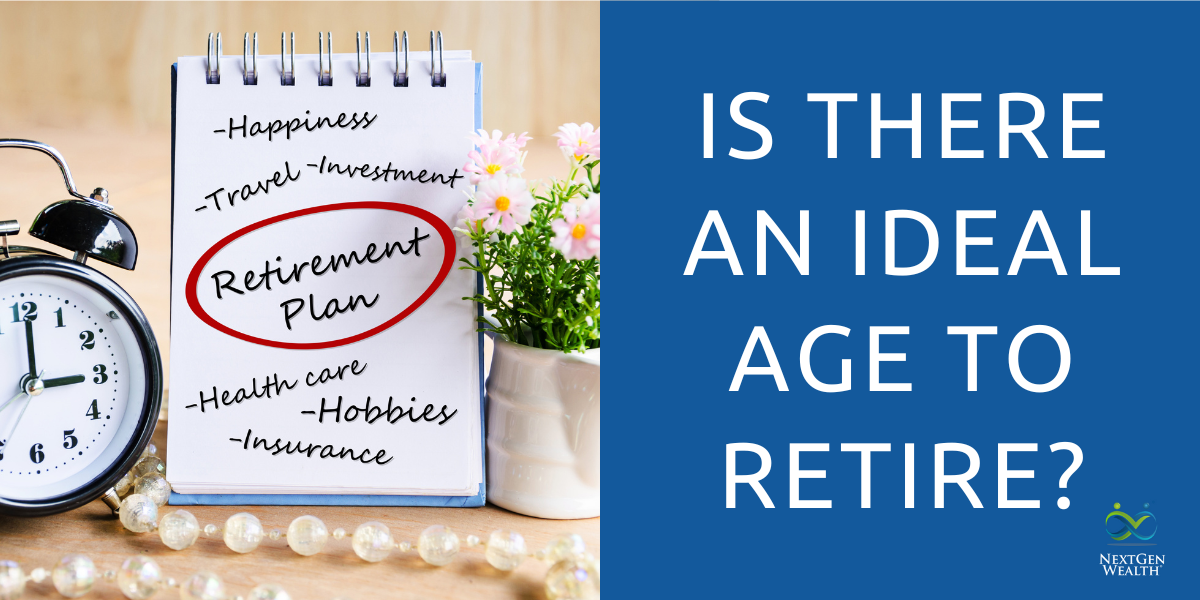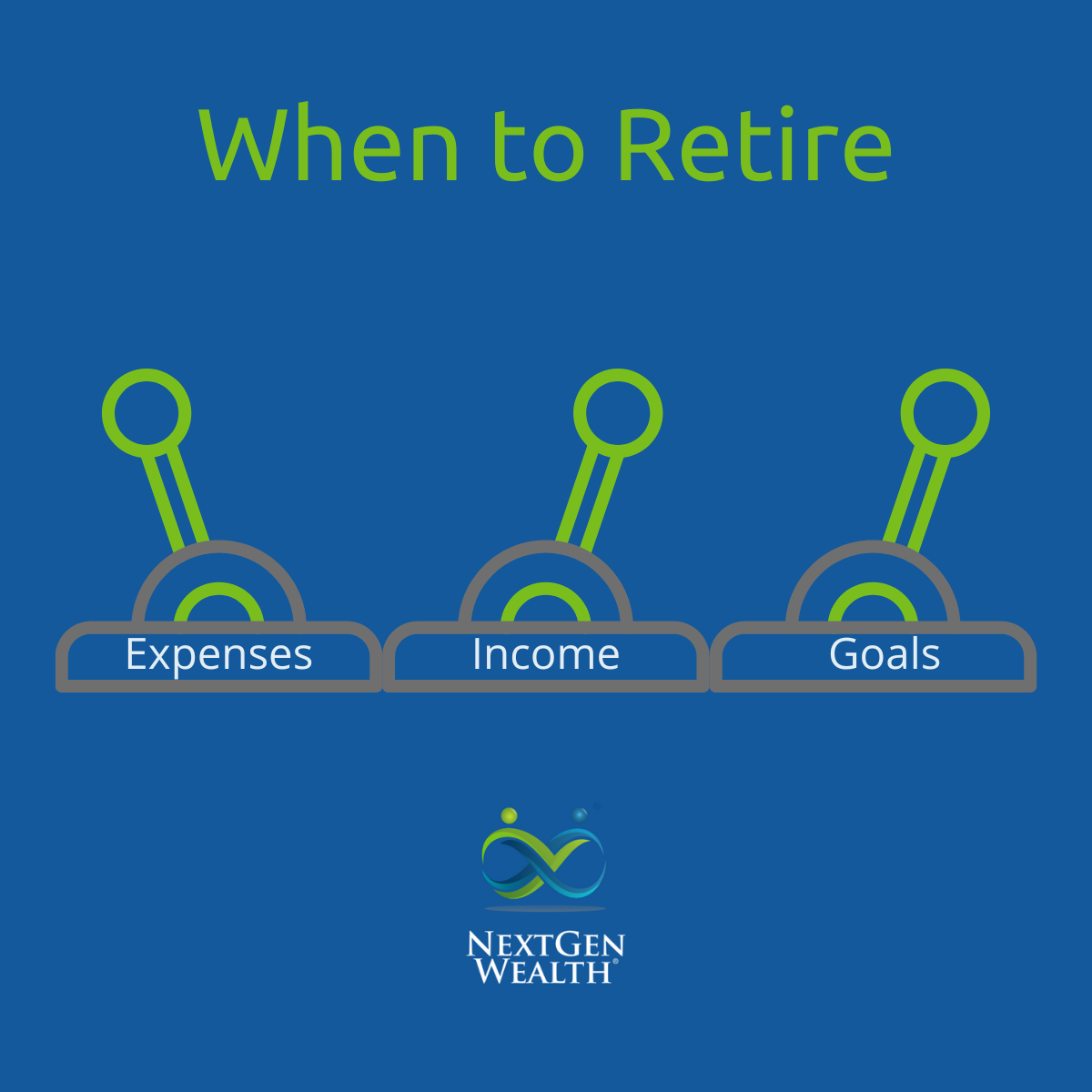 There may be several points in your life that are ideal to retire, but when is best for you? As you approach retirement, you might be wondering, “Is there an ideal age to retire?” Of course, this depends on your unique personal and financial situation.
There may be several points in your life that are ideal to retire, but when is best for you? As you approach retirement, you might be wondering, “Is there an ideal age to retire?” Of course, this depends on your unique personal and financial situation.
It’s understandably difficult to pinpoint exactly what retirement will look like. Did you know five years ago exactly what your life would look like today? Yeah, we didn’t either.
What “Ready” to Retire Looks Like for You
The first thing we need to do is understand what “ready” looks like for you. Does that mean a certain level of expenses, access to Medicare or Social Security benefits, or timing with a spouse or family member?
Changes in lifestyle and income can dramatically change how your expected retirement and actual retirement compare. To make this a little more manageable, we’ll consider two main categories of preparedness – financial and emotional.
Just because you’re emotionally ready to retire, doesn't mean you’re financially ready to retire. We have to be careful about getting the cart ahead of the horse here. Being financially ready to retire can happen without being emotionally ready to retire. This is why planning out every stage of retirement can be so critical.
Financial Readiness to Retire
Like we mentioned before, you cannot pull the trigger on retiring if you’re not financially ready. Let’s tackle that first. Your current income should be slowly converted to retirement income over time.
How Much Money Do You Need?
The amount of money you need to retire depends largely on your estimated retirement expenses and other sources of income. Your expenses will change over time, but you can get a reasonable estimate based on current expenses.
Non-Negotiable Expenses
Covering your home, healthcare, food, and utilities are 100% non-negotiable. Granted, you can cut back on some of these, but you need the basics to survive. These are expenses we must cover in any situation.
The essentials are relatively easy to estimate based on your current expenses. You’re not likely to spend a lot less in retirement. You can use a rule of thumb like 80% of current expenses as a starting point. However, there are many variables such as when you’ll pay off your house, supporting children, and travel, etc.
Reducing Expenses
Reducing expenses yields more after-tax “bang for your buck” than adding additional income. It’s also hard to do once you’re accustomed to a certain quality of life. Every extra dollar you make is taxed, but you’re not taxed for cutting expenses.
Paying Off the House
One big expense you can reduce is paying off your mortgage if you haven’t already. You’ll still need to cover property tax, utilities, and maintenance. However, those are easier to handle once the house is paid off.
There are many different mathematical and personal reasons to pay your house off early. The main point here is whatever you decide will affect how much retirement income you need.
Determine [Nearly] Guaranteed Income Sources
Nothing is guaranteed, but some income streams are very stable. For instance, having an exact amount of Social Security isn’t guaranteed. However, barring some major changes to the law, Social Security benefits will be paid out in full until 2035 with reduced benefits thereafter (if nothing else changes…which most likely won’t be the case). If Social Security will be enough to cover your monthly living expenses, then that’s a big weight off your shoulders.
More Than the Minimum
Nobody expects to live a bare-minimum retirement. You’ve worked hard your whole life, so now you want to reap the benefits of your efforts. Without proper planning, you could run out of money – not good.
We suggest you take a holistic approach and develop income streams to cover all your goals - not just the minimum. In fact, this is one of the first things we do in our COLLAB Financial Planning Process™. It is essential to assess, protect, and develop income sources to achieve your goals in life.
The minimum isn’t good enough for you. We want you to have a comfortable and fulfilling retirement. If your current income sources aren’t going to provide this, some changes may be necessary.
Employing Financial Planning Strategies
This is one of the most beneficial parts of the financial planning process. Looking for potential tax savings or optimizing retirement income can have huge potential benefits. Even a somewhat simple strategy like a Roth conversion can make a really significant difference.
One Small Tangent: Working With a Financial Planner
Engaging with a professional who has the training and experience to identify and implement advanced strategies can have massive benefits. A financial planner has the benefit of being able to zoom out, look at the mathematically optimal strategies moving forward, and help balance those with your lifestyle.
I know it sounds like we’re tooting our own horn (because we are), but whether it’s NextGen Wealth or another financial advisor, financial planning can yield real tangible (and intangible) benefits! Studies have shown that engaging with a financial planner far outweighs the costs.
Helping you have a more fulfilling and stress-free retirement is why we do what we do. We’d be remiss if we didn’t talk about what we’ve dedicated our whole lives to – helping people like you retire the right way. Now back to your regularly scheduled programming.
Developing Additional Sources of Retirement Income
If reducing expenses (without adjusting goals) and employing tax or financial planning strategies still won’t cover your retirement needs, you’ll need to generate more income. This will vary for everyone and might not even be an option. If you can generate additional income from real estate or bump up your retirement contributions, this might do the trick.
Part-time employment may be an option for some but not for others. If you can engage in meaningful work, it could have additional health and longevity benefits too. This might be useful as a backstop for tackling any unexpected changes coming your way.

Adjusting Goals
If all else fails, you may need to look at adjusting some goals. This might not be a pleasant exercise, but it may be necessary. You might also be surprised to find that smaller changes over the course of your entire retirement could have a greater impact than larger, one-time changes.
Also, you never know what tomorrow might bring, so prioritizing the things most important to you now is vital. Another way to frame this is, what will you regret not doing if this is your last “good” year? It might not be fun to think about, but this is the emotional aspect we mentioned earlier.
Emotional Preparedness for Retirement
You’re not going to regret more time with family. People often do regret working too much though. Developing an understanding of what matters most to you will pay off big. How do you do that though?
Humans are generally pretty bad at predicting what exactly will make us happy. However, we can still optimize the time we have and find fulfillment. More isn’t likely to make us happier. Disconnecting from work (retiring) doesn’t automatically switch on happiness either.
Many studies have covered the hedonic treadmill we often find ourselves trapped on wanting more and more. Ultimately, our mindset affects our happiness as much or more than anything else. Useful techniques include practicing gratitude and nurturing relationships with friends and family.
No matter what, you need to have a plan for what you’re retiring to, not what you’re retiring from. If you have a clearer picture of what you want retirement to look like, it makes the transition so much easier.
Retiring Earlier (or Later)
In all honesty, age is legitimately just a number. There’s nothing magic about 65. Sure, there’s lots of things tied to different ages like Medicare and Social Security, but you don’t have to plan your whole life around those.
If you’ve prepared yourself financially, then you can make decisions to bring you joy – not just survival. We’re not suggesting you should sabotage your financial future to retire early. However, working in a job you don’t like when you could have retired earlier is even worse.
If you’re in a career you love or can switch to one, then retirement may not even be that interesting to you. Just because you reach full retirement age, doesn’t mean you have to retire – or at least not fully. You might discover working part-time and spending the rest of your time with friends and family is more rewarding.
Just One More Year
It can be easy to say you’ll work “just one more year.” However, you really need to look at what you’re trading. Death rates climb significantly after age 55.
Having a plan and determining both emotionally and financially when you’ll be ready and able to retire is key. It’s a huge transition, so putting off retiring may be easier than taking the leap. There’s uncertainty, but you always have options.
In 2019, 374,937 people died between the ages of 55 and 64, just on the cusp of “normal” retirement age. That’s 13.1% of all deaths for the year. We never know when we step out of bed for the last time.
Making it Count
We want you to be able to maximize every minute of your life. Looking at the big picture is so incredibly important. Working an additional couple of years so you can have a vacation home doesn’t matter if the additional stress or wear and tear on your body keeps you from enjoying it.
We have no way of knowing how long you’ll live or what your health will be throughout retirement. However, none of us are getting younger. Ultimately, you need to strike a healthy balance between living in the moment and preparing for tomorrow. The ideal age to retire has a lot more to do with you than your money.


